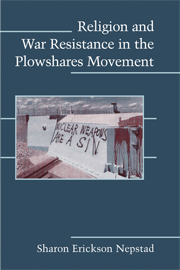Book contents
- Frontmatter
- Contents
- List of Tables and Figures
- Preface
- Acknowledgments
- Religion and War Resistance in the Plowshares Movement
- INTRODUCTION: MOVEMENT CHALLENGES AND TRAJECTORIES
- Part I The U.S. Plowshares Movement
- 1 HISTORICAL DEVELOPMENT OF THE U.S. PLOWSHARES MOVEMENT
- 2 TACTICAL LEGITIMATION AND THE THEOLOGY OF RESISTANCE
- 3 SUSTAINING COMMITMENT
- 4 DEATH OF A CHARISMATIC LEADER
- Part II The International Plowshares Movements
- 8 CONCLUSION: FROM FAILED ATTEMPTS TO PERSISTENT RESISTANCE – UNDERSTANDING DIVERGENT MOVEMENT TRAJECTORIES
- Appendix A Survey Questionnaire
- Appendix B List of Interviews by Author
- Appendix C Chronological List of Plowshares Actions by Region
- Bibliography
- Index
2 - TACTICAL LEGITIMATION AND THE THEOLOGY OF RESISTANCE
Published online by Cambridge University Press: 05 September 2012
- Frontmatter
- Contents
- List of Tables and Figures
- Preface
- Acknowledgments
- Religion and War Resistance in the Plowshares Movement
- INTRODUCTION: MOVEMENT CHALLENGES AND TRAJECTORIES
- Part I The U.S. Plowshares Movement
- 1 HISTORICAL DEVELOPMENT OF THE U.S. PLOWSHARES MOVEMENT
- 2 TACTICAL LEGITIMATION AND THE THEOLOGY OF RESISTANCE
- 3 SUSTAINING COMMITMENT
- 4 DEATH OF A CHARISMATIC LEADER
- Part II The International Plowshares Movements
- 8 CONCLUSION: FROM FAILED ATTEMPTS TO PERSISTENT RESISTANCE – UNDERSTANDING DIVERGENT MOVEMENT TRAJECTORIES
- Appendix A Survey Questionnaire
- Appendix B List of Interviews by Author
- Appendix C Chronological List of Plowshares Actions by Region
- Bibliography
- Index
Summary
The General Electric action in King of Prussia became the inaugural event that launched the Plowshares movement. That action would never have grown into a full-fledged movement, however, if its tactics were considered an illegitimate means of resistance. Yet, as the draft board raid controversy illustrated, property destruction was not a tactic that automatically received approval from religious activists or the broader peace movement. On the contrary, there were many negative reactions, as Philip Berrigan indicated in his “Letter from a Baltimore Jail,” written shortly after the Catonsville raid. Berrigan wrote:
Some of you have been sorely perplexed with me; some of you have been angry, others despairing. One parishioner writes of quarreling with people who thought me mad. After all, isn't it impudent and sick for a grown man (and a priest) to slosh blood… on draft files; to terrorize harmless secretaries doing their job; to act without ecclesiastical permission and to disgrace the collar and its sublime office?… You had trouble with blood as a symbol – uncivilized, messy, bizarre.… You had trouble with destruction of property, with civil disobedience, with priests getting involved, and getting involved this much. Let's face it: perhaps half of you had trouble with us acting at all.
The parallel to the well-known “Letter from a Birmingham Jail” was intentional since the purpose of Berrigan's correspondence was the same as Dr. King's – namely, justifying his method of resistance.
- Type
- Chapter
- Information
- Religion and War Resistance in the Plowshares Movement , pp. 59 - 86Publisher: Cambridge University PressPrint publication year: 2008



